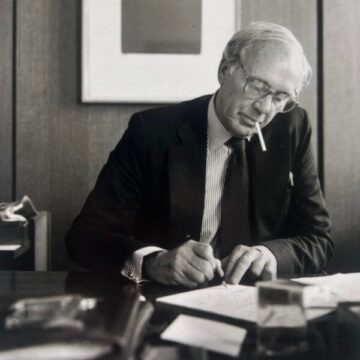Lewis Lapham in Harper’s Magazine (1975):
 On first opening a book I listen for the sound of the human voice. Instead of looking for signs, I form an impression of a tone, and if I can hear in that tone the harmonies of the human improvisation extended through 5,000 years of space and time, then I read the book. By this device I am absolved from reading most of what is published in a given year. I have found that few writers learn to speak in the human voice, that most of them make use of alien codes (academic, political, literary, bureaucratic, technical) in which they send messages already deteriorating into the half-life of yesterday’s news. Their transmissions seem to me incomprehensible, and unless I must decipher them for professional reasons, I am content to let them pass by. Too many subtle voices divert my attention, to the point that when I enter a bookstore I am besieged by the same sense of imminent discovery that follows me through seaports and capital cities. This restlessness never troubles me in libraries, probably because libraries are to me like museums. It is the guile of commerce that accounts for the foreboding in bookstores; I have a feeling of the marketplace, of ideas still current after 2,000 years, of old men earning passage money by telling tales of what once was the city of Antioch.
On first opening a book I listen for the sound of the human voice. Instead of looking for signs, I form an impression of a tone, and if I can hear in that tone the harmonies of the human improvisation extended through 5,000 years of space and time, then I read the book. By this device I am absolved from reading most of what is published in a given year. I have found that few writers learn to speak in the human voice, that most of them make use of alien codes (academic, political, literary, bureaucratic, technical) in which they send messages already deteriorating into the half-life of yesterday’s news. Their transmissions seem to me incomprehensible, and unless I must decipher them for professional reasons, I am content to let them pass by. Too many subtle voices divert my attention, to the point that when I enter a bookstore I am besieged by the same sense of imminent discovery that follows me through seaports and capital cities. This restlessness never troubles me in libraries, probably because libraries are to me like museums. It is the guile of commerce that accounts for the foreboding in bookstores; I have a feeling of the marketplace, of ideas still current after 2,000 years, of old men earning passage money by telling tales of what once was the city of Antioch.
The murmurings of these voices often reduce me to a state of hesitation in which I cannot choose between opposite directions.
More here.
Enjoying the content on 3QD? Help keep us going by donating now.
